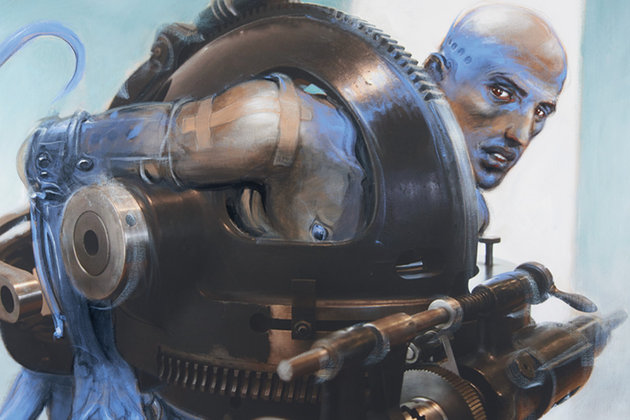 |
| The Eiffel Tower in Paris on a gorgeous, but rather toasty summer day |
 |
| Some of the automata on display at the Musée des Arts et Métiers |
Enki Bilal was the artist. I've never really been into cartoons or modern art in general, but I'd also never been in an exhibit that so thoroughly engaged all five of my senses. It was entitled Mécanhumanimal and depicted semi-terrifying man-machine hybrids and a dystopian world wholly devoid of any warm, fuzzy emotion I'm familiar with. I was actually a little terrified walking through the dark hallways and hearing mechanical breathing not unlike Darth Vader and looking in a mirror to not see my reflection but a digital skull.
 |
| Mécanhumanimal by Enki Bilal |
I could not describe the look of utter surrender and passion in the figure's eyes and credit to Bilal for being able to convey those emotions so vividly. Clearly in this instance it was those emotions that defined his humanity, the very reason for his existence. But what of the mechanized temptresses I saw in the other drawings? Was it the passion they evoked that made them human or was it an abdomen of flesh and blood?
Were these figures human at all? Are machines then capable of these same human emotions? And then there's the issue degrees of humanity. Does the depth of the emotion I feel determine how human I am? Or is it how successfully I can complete certain tasks? Or how quickly I learn and forget?
My brother, a soon-to-be-lawyer, and I often argue over which one of us will provide the world with the more valuable service? I think that as a doctor, I'll be the one doing more good (but I expect his net worth might prove me wrong someday). I'm not sure I've ever been able to articulate this clearly enough to him, but I think I'll be providing the more valuable service because I will be the one required to feel emotion. In practicing and perfecting the craft of medicine, I will necessarily have to empathize with patients and allay their fears. As a lawyer, I'm not sure my brother will necessarily need to feel the pain of his clients so thoroughly. Surely, the experience of feeling this emotion contributes more to the human race than protecting monetary assets.
In any sense, I hardly expect to define humanity or chart out a scale of it any time soon. But at least I know my father will always agree with me, that medicine is more valuable than legal training, even if it is only to keep peace in the house.
No comments:
Post a Comment